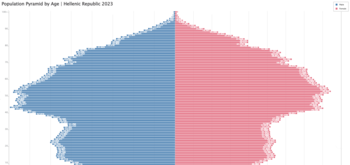
Back Yunanıstan əhalisi Azerbaijani Греция халҡы Bashkir Население на Гърция Bulgarian Demografia de Grècia Catalan Obyvatelstvo Řecka Czech Demograffeg Gwlad Groeg Welsh Δημογραφία της Ελλάδας Greek Demografía de Grecia Spanish Démographie de la Grèce French Demografía de Grecia Galician
| Demographics of the Hellenic Republic | |
|---|---|
 Greece population pyramid in 2023 | |
| Population | |
| Growth rate | -1.01 people/1,000 population (2010 est.) |
| Birth rate | 7.9 births/1,000 population (2020 est.) |
| Death rate | 12.3 deaths/1,000 population (July 2020 est.) |
| Life expectancy | 82.2 years |
| • male | 79.8 years |
| • female | 84.7 years |
| Fertility rate | 1.35 children born/woman (2018)[2] |
| Infant mortality rate | 3.75 deaths per 1,000 live births (2019 est) |
| Age structure | |
| 0–14 years | 14.1% |
| 15–64 years | 63.3% |
| 65 and over | 22.6% |
| Sex ratio | |
| At birth | 1.06 male(s)/female (2008 est.) |
| Under 15 | 1.06 male(s)/female |
| 15–64 years | 1.00 male(s)/female |
| 65 and over | 0.78 male(s)/female |
| Nationality | |
| Nationality | noun: Greek(s) adjective: Greek |
| Major ethnic | Greeks |
The Demographics of Greece refer to the demography of the population that inhabits the Greek peninsula. The population of Greece was estimated by the United Nations to be 10,445,365 in 2021 (including displaced refugees).
- ^ "Στοιχεία Υπολογιζόμενου Πληθυσμού (1.1.2023) και Μεταναστευτικών Ροών της Χώρας (2022) - ELSTAT". www.statistics.gr.
- ^ "Hellenic Statistical Authority Demographic indicators / 2018". Retrieved 7 August 2020.